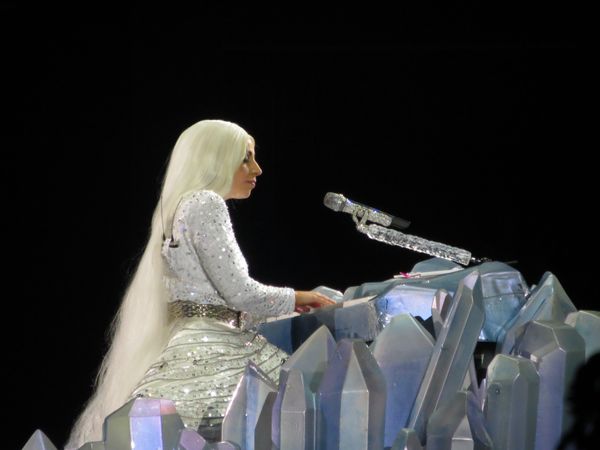Beyoncé is the reigning Queen of epic surprises and urban-contemporary artistry. For those who know me reading this, you know that Beyoncé has always had my heart. She embodies so much power and grace in her presence and in her music. She empowers women of all backgrounds and advocates for the appreciation and respect of black culture.
I don't know Beyoncé personally (although I would love if the Lord could make that happen), but she's established herself as an artist that everything she releases shows a part of herself. Her struggles, her passions, and her experiences all lay themselves out track by track to unveil herself to her listeners. I am a huge fan of Beyoncé, but I'm not going to say that every piece of work of hers was absolute perfection. Her music has gone through evolutions. She's experimented with sounds and then perfected them for herself. Producing messages that transcend being a pop titan and a record-setting artist.
I believe that the biggest shift started after her release of "4" in 2011. Beyoncé eschewed the music of her previous releases in favor of an intimate, personal album. 4's lyrics emphasize monogamy, female empowerment and self-reflection, a result of Beyoncé considering a more mature message to contend artistic credibility. This was also around the time that she was pregnant with Blue Ivy. This album encompassed a new phase in her career as a mother and wife. "Run the World (Girls)," "Love On Top," and "Countdown" were huge songs on the album talking about love and the role of her significant other in her life. Then there was "I Was Here" talking about her desire to leave a mark on the world as both an artist and person, and nobody can dispute that she's done just that.
"Beyoncé" her eponymous, or self-named, fifth solo album was released in December 2013. Developed as a "visual album", its songs accompanied by non-linear short films that illustrate the musical concepts conceived during its production. Its dark, intimate subject material includes feminist themes of sex, monogamous love, and relationship issues, inspired by Beyoncé's desire to assert her full creative freedom. Departing from the traditional R&B leanings of its predecessor, the songs in "4" are predominantly alternative R&B. Hence, musically, the album can be considered the post-dubstep era, fusing electronic music with R&B and soul. The album's dark, moody production is more textured than previous releases and songs are characterized by heavy bass as well as prominent synthesizers. Personally this was my least favorite album as a whole, but there are some definite stand outs for me just because of my own personal taste in music. XOXO, Partition, and Flawless and Flawless Remix ft. Nicki Minaj are all bangers, but because of this was the first time she began using this kind of sound and mood for an album I think it needed the experimentation phases to accomplish what would be her next album.
Lemonade, in my opinion, was the height of Beyoncé's both artistic and musical expression. Under the facade of the infidelity of her husband, she talks about and visually displays her feelings towards being a black woman. She criticizes and spotlights the necessity for both justice and understanding of what it means to be black in America, and how people of color specifically black women are deprived from various opportunities, meaning that they must work harder for what they achieve in life. The Washington Post called the album a "surprisingly furious song cycle about infidelity and revenge", referencing the classical compositional genre: a group, or cycle, of individually complete songs designed to be performed in a sequence as a unit. The Chicago Tribune described the album as "not just a mere grab for popular music dominance, rather it is a retrospective that allows the listener to explore Beyoncé's personal circumstances." She dabbles in urban punk, to jazz and swing, with gospel and spiritual undertones. I believe she found herself as an artist through the production of both visual and audio album and executed her understanding of how impactful her voice can be for the betterment of people with her platform.
However, the queen has returned after being very busy in the last year and a half. Beyoncé was the first black woman to headline at Coachella this year and used to the opportunity to highlight the life and legacies of Historically Black Colleges and Universities and the prolific and renowned marching bands the institutions are home to. She had done collaborations with both Eminem and Ed Sheeran ("Walk on Water" and "Perfect: Duet Remix"), and recently just began her On the Run 2 Tour with her husband Jay Z. Then she dropped "Everything is Love" with her husband under a joint name "The Carters." In a recent article done by Kevin Allred from NBC he writes about Beyonce's continued use of her platform to promote black culture through "civil disobedience."
"She's not holding sit-ins at lunch counters or organizing formal marches, but her performances have become increasingly subversive. Indeed, over the past two years Beyoncé has gradually infiltrated and commandeered traditionally white spaces with the most undeniably black performances of her career. She has done this, not to seek inclusion in those spaces, but to highlight the way they have inherently and historically excluded people of color. Her brand of distinct pop culture civil disobedience celebrates both black history and black womanhood, while simultaneously creating discomfort, backlash and hopefully, conversation."
This quote is in reference to Beyoncé and Jay Z's decision to film the music video for "Apeshit" at The Louvre in Paris. The album as whole is the conclusion to the chronicled introspection demonstrated by Jay-Z and Beyoncé in "Lemonade" and "4:44." With mastered production the couple balances an old-school meets new school sound in a urban-contemporary genre while drawing on musical motifs from both of their albums. The nine-track album talks about love, family, and the dominance they have in the music industry both as individuals and as a family unit.
I don't want to give to much away for those who have not had the chance to listen to the album, but know that the Beyoncé today is not the same woman who came out with "Single Ladies" in 2008. She has become so successful that her role as an artist means more than being a moneymaker, and yet she benefits from both. She has demonstrated that she is merely in competition with herself; making herself better, supporting and raising a prosperous family, and delivering messages in ways that only she can. That's why she is the queen.



















